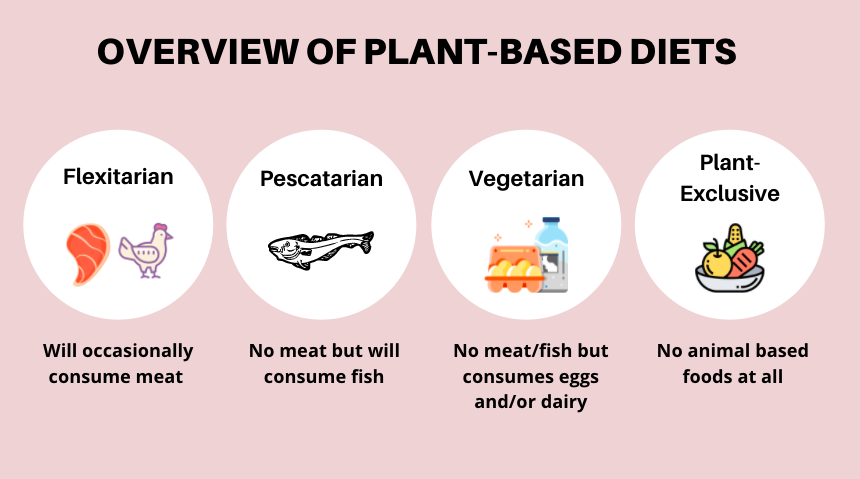What is a plant-based diet?
In relation to plant-based and vegan diets, I still think there is a lot of confusion in regards to the difference between them. Questions like “Are vegan diets healthy?” and “Can a plant-based diet help with diabetes?” are commonly asked. And I absolutely understand why! Talk about vegan and plant-based diets has exploded in recent years which has invited a lot of interest along with many questions about how they contribute to our health.
For this reason, I wanted to dedicate this post to clearing up the confusion and clearly defining both vegan and plant-based diets as when it comes to eating for optimal health, there can be huge differences between both.
Let's start with veganism.
Veganism is a philosophy, a way of life, that seeks to exclude as much as possible any cruelty to and exploitation of animals. It goes beyond just the food you eat, including everything from the clothes you wear to the household and personal products that you use such as cosmetics and cleaning products.
"Becoming vegan is about making an ethical decision to become more aware of our connections to fellow creatures and to widen our circles of compassion to respect their right to exist and lead pain-free lives. It requires taking a stand against deeply rooted customs and traditions - customs and traditions that are often practiced by people we love, respect and admire." - Brenda Davis, RD, Becoming Vegan
A vegan diet excludes meat, poultry, fish, dairy products, eggs, gelatin, honey, and other foods of animal origin (except human breast milk) and includes all foods of plant origin.
Walking around your local supermarket, you’ll be amazed at the amount of vegan-friendly foods on offer, everything from sausages and burgers to ice-creams. It has gotten to a point that anything you usually eat, you can now have vegan. For animal ethics and environmental sustainability, it’s incredible to see. And for anyone looking to make the move to a more health-focused plant-based diet, these are great transition foods. However, in terms of supporting optimal health long-term, a whole food plant-based diet is what you really want to focus on.
What is a plant-based diet?
Following a plant-based diet does not mean you are vegetarian or vegan and never eat meat or dairy. Rather it means you are choosing the majority to all of your foods from plant sources with or without limited amounts of animal-sourced foods.
Plant-based foods include fruits, vegetables, nuts, seeds, wholegrains, legumes, herbs and spices. The main motivation for following a plant-based diet may be based on health and/or environmental concerns.
There are various types of plant-based diets also which are highlighted in the graphic.
Flexitarians will occasionally consume meat
Pescatarians will consume fish but no meat
Vegetarians will consume eggs and/or dairy but no meat or fish
Plant-exclusive (fully plant-based diets) consume zero animal-based foods at all
In terms of health, why are whole food plant-based diets recommended?
Here are just 5 benefits of a whole food plant-based diet:
Supports a healthy gut microbiome.
Fibre is the primary fuel for your gut microbes (the trillions of microbes that reside in your gut and provide you with a whole host of health benefits when looked after right).
Fibre is only found in plant-based foods of which the best sources are legumes, wholegrains, fruits and vegetables.
Supports your immune system.
70% of your immune system is found in your gut
Plant foods are packed with nutrients such as vitamins A, C & E that help strengthen your immune system
When you consume fibre-rich whole plant foods, you help strengthen your gut microbiome and thus support an optimally functioning immune system
Reduces risk of chronic disease
A plant-based diet is linked to a lower risk of type 2 diabetes, heart disease and cancer.
A whole food plant-based diet drastically lowers your intake of saturated fat, trans fat and dietary cholesterol all of which increase LDL cholesterol in your blood and contribute towards the development of various chronic disease
Supports healthy brain functioning
The gut is directly connected to the brain through the vagus nerve.
When the gut is fed fibre, it releases short-chain fatty acids which can cross through to your brain and release a whole host of benefits.
Due to this connection, a plant-based diet is linked to mood, cognition and a reduction in depression, anxiety and fatigue.
Plant-based diets are also linked to a reduced risk of alzheimer’s and stroke.
Boosts energy levels and mood
A plant-based diet is great for digestion (a process that utilizes a lot of energy),
It can help you get a good night of quality sleep so that you wake up feeling refreshed and ready to take on your day in a positive way.
You won’t have to rely on caffeine or sugary treats anymore to boost your energy when you usually hit that midday slump. Whole plant foods help control blood sugar so you get a nice steady balance of energy throughout your day keeping both your mind and body functioning as they should be.
The protein from plant-based foods is easier to digest and does not put your digestive system through added stress and energy expenditure.
To sum it up, a plant-based diet does not mean you are vegan. Choosing to eat a health-promoting diet made up of mostly whole plant foods means you want to look after your health to give yourself the best chance of living a long, healthy, illness-free life. The key to success is keeping it as simple and enjoyable as possible. Once you start feeling the benefits of a whole food plant-based diet, you really won’t want to eat any other way.
